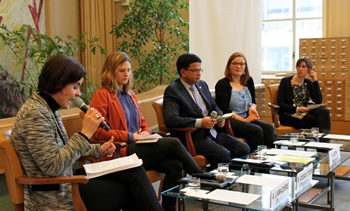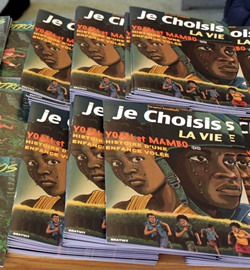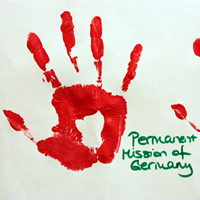"Sketching the Way to Peace" - UNITAR Launches Child Soldier Comic Books
 12 February 2016, Geneva, Switzerland – on the occasion of the International Day Against the Use of Children as Soldiers, the United Nations Institute for Training and Research (UNITAR) has successfully launched two comic books that were developed jointly with former child soldiers in the Democratic Republic of Congo and in Colombia. These comics reflect the reality of an estimated 300,000 children in more than 20 countries around the globe who are being forced to fight, spy, and work as couriers, cooks, cleaners and even sex slaves – in other words they are living the reality of a child soldier.
12 February 2016, Geneva, Switzerland – on the occasion of the International Day Against the Use of Children as Soldiers, the United Nations Institute for Training and Research (UNITAR) has successfully launched two comic books that were developed jointly with former child soldiers in the Democratic Republic of Congo and in Colombia. These comics reflect the reality of an estimated 300,000 children in more than 20 countries around the globe who are being forced to fight, spy, and work as couriers, cooks, cleaners and even sex slaves – in other words they are living the reality of a child soldier.
The launch of the comics was held in the format of a Library Talk in the UN Library Geneva with the title “Sketching the Way to Peace”. The diverse panel, of both UN and civil society representative, shared creative and innovative ideas to make the voice of child soldiers heard and take steps towards a world in which child soldiers are not part of violent conflict anymore. A specific focus was put on the power of images and storytelling for spreading messages of protection, prevention and peace. The full recording of the Library Talk can be watched on the recorded web stream.
 The two comics “Mambo et Joali” and “Nosotros” were developed in 2014/2015 by UNITAR in partnership with the Roméo Dallaire Child Soldiers Initiative and local child protection organizations in the Democratic Republic of Congo (DRC) and Colombia and the support of the German government. Although the storylines differ, the overarching goal is the same for both books – they aim at strengthening the capacity of local communities to help prevent the recruitment of children as soldiers. Speaking the universal language of images, the comics help spread basic protection strategies among children, young people and the broader population in conflict-affected areas where children are at risk of being recruited or re-recruited. The comics were created in a participatory process through focus group session with former child soldiers in Bukavu and Goma and Calí and Medellín respectively.
The two comics “Mambo et Joali” and “Nosotros” were developed in 2014/2015 by UNITAR in partnership with the Roméo Dallaire Child Soldiers Initiative and local child protection organizations in the Democratic Republic of Congo (DRC) and Colombia and the support of the German government. Although the storylines differ, the overarching goal is the same for both books – they aim at strengthening the capacity of local communities to help prevent the recruitment of children as soldiers. Speaking the universal language of images, the comics help spread basic protection strategies among children, young people and the broader population in conflict-affected areas where children are at risk of being recruited or re-recruited. The comics were created in a participatory process through focus group session with former child soldiers in Bukavu and Goma and Calí and Medellín respectively.
“Mambo and Joali”, created in the Democratic Republic of Congo (DRC) tells the story of a brother (Mambo) and sister (Yoali). Yoali, together with her uncle, who is a doctor, is abducted at night by an armed group. When Mambo returns home, he finds his mum dead and his sister and uncle gone. He goes on a quest to seek revenge and find the camp of the armed group. When he finally gets there, he “volunteers” as a soldier with the armed groups as he is driven by his anger and emotions. All three of them have to witness and commit incredible crimes. When Yoali is about to be turned into a sex slave for the commander of the group, Mambo and his uncle develop a plan to escape. Mambo et Yoali was also translated into Swahili and Lingala.
“Nosotros”, the second comic, was developed in Colombia. It tells the story of Marcela and Anderson – and against all odds, this comic actually tells a love story. Anderson is being recruited by an armed group by attracting him to weapons. While Anderson undergoes a rigorous training, Marcela joins the group voluntarily to be together with him. Both have to fight in the lines of the armed group. When Marcela turns pregnant, Anderson helps her to escape, but has to stay behind himself. The story was designed with as little words as possible to make it accessible to the widest audience possible.
The International Day Against the Use of Child Soldiers is also called the "Red Hand Day". The Red Hand Day seeks to draw attention to the fates of child soldiers. It calls for action against this practice and for the support of children who are affected by it. Since 2002 hundreds of events have been organized each year on February 12 to recognize the plight of child soldiers and hundreds of thousands of red handprints have been collected in more than 50 countries and handed over to decision makers. Participants of the Library Talk have expressed their support of ending the use of children as soldiers through leaving a symbolic red handprint.
Related links
the Roméo Dallaire Child Soldiers Initiative
Photo 1: Panelists at the Library Talk
Photo 2: Commic book “Mambo and Joali”
Photo 3: Red handprint of a representative of the Permanent Mission of Germany in Geneva

